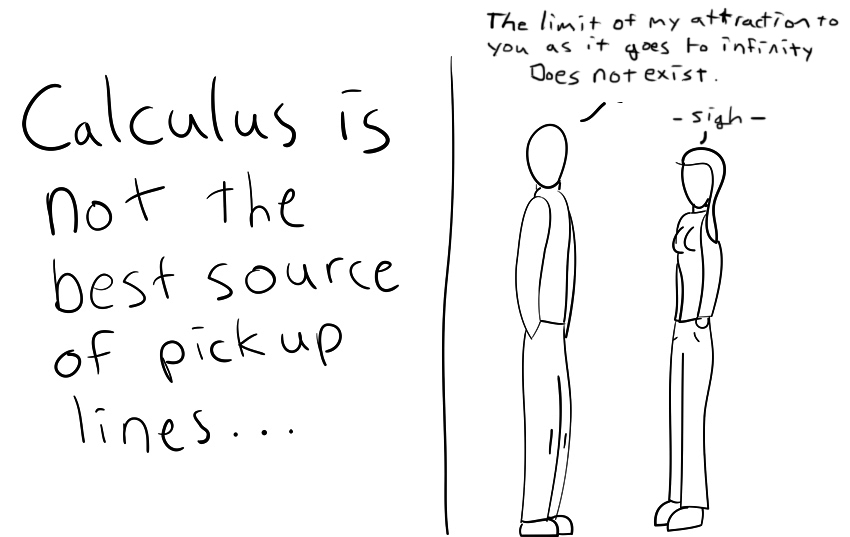MATH 201 Syllabus (doc) (pdf)
Week at a Glance:
Monday: Review for Final Exam
Tuesday: Office hours 10-11
Mathematics Tutorial Center (MTC) 1-2
Wednesday: Office hours 11-12
MTC 12-1

Friday: Office hours 11-12
Lecture Notes:
Section 1.1 (Limits: An Intuitive Approach)
Section 1.2 (Computing Limits)
Section 1.3 (Limits at Infinity; End Behavior of a Function)
Section 1.5 (Continuity)
Section 1.6 (Continuity of Trigonometric Functions)
Section 2.1 (Tangent Lines and Rates of Change)
Section 2.2 (The Derivative Function)
Section 2.3 (Introduction to Techniques of Differentiation)
Section 2.4 (The Product and Quotient Rules)
Section 2.5 (Derivatives of Trigonometric Functions)
Section 2.6 (The Chain Rule)
Section 2.7 (Implicit Differentiation)
Section 2.8 (Related Rates)
Section 2.9 (Local Linear Approximation; Differentials)
Section 3.1 (Analysis of Functions I: Increase, Decrease, and Concavity)
Section 3.2 (Analysis of Functions II: Relative Extrema; Graphing Polynomials)
Section 3.4 (Absolute Maxima and Minima)
Section 3.5 (Applied Maximum and Minimum Problems)
Section 4.2 (The Indefinite Integral)
Section 4.3 (Integration by Substitution)
Section 4.5 (The Definite Integral)
Section 4.6 (The Fundamental Theorem of Calculus)
Section 6.2 (Derivatives and Integrals Involving Logarithmic Functions)
Section 6.3 (Derivatives of Inverse Functions; Derivatives and Integrals Involving Exponential Functions)
Section 6.4 (Graphs and Applications Involving Logarithmic and Exponential Functions)
Section 6.5 (L'Hopital's Rule; Indeterminate Forms)
Homework:
Write-up 1.1 #20 for a solution manual. (due Wednesday, 1/18)
Write-up 1.2 #32 for a confused classmate (due Monday, 1/23)
Write-up "Show that the equation x^4-x^2+2x-1=0 has at least one solution in the interval [-1,1]." for Dr. Abernathy (convincing her you know what you're doing :) ) (due Monday, 1/30)
Write-up "Find equations of both lines through the point (2,-3) that are tangent to the parabola y=x^2+x." for an AP high-school calculus student (due Monday, 2/6) (Hint: Section 2.3 Example)
Write-up 2.5 #31 for a calculus textbook. (due Monday, 2/13)
Write-up "Show (by example) that if c is a critical number, then c is not necessarily a relative maximum or minimum" for an obnoxious math nerd that insists "All critical numbers are maximums or minimums." (due Monday, 3/5)
Write-up 3.5 #12 for a caluclus textbook. (due Wednesday, 3/28)
Write-up 4.3 #42 (due Monday 4/9)
Projects:
Project Guidelines
Finding Zeroes of a Polynomial - Due Friday, March 23rd
Who Wins the Race? - Due Monday, April 23rd
Test Reviews:
Test 1 Review (pdf) (key)
Test 2 Review (pdf) (key) - ignore #15 & 16
Test 3 Review (pdf) (key) - ignore #7 - 17; look back at Test Review 2 problems #15 & 16
Test 5: It might be helpful to look at the following homework problems:
4.5: 13, 15, 17, 21, 23, 25, 27, 41
4.6: 5, 7, 11-21 odd, 25, 35, 37, 39, 41, 47, 53
6.2: 1-29 odd, 35-43 odd, 47-51 odd, 57-67 odd, 69, 71
6.3: 15-35 odd, 45, 47, 55-77 odd
6.4: 5-23 odd
Extra Credit Opportunities:
For 5 points on Test 3, you may choose one of the following options (due: Monday 4/2)
1. Attend the math presentation by Patrick Dukes at the NERDs meeting on Tuesday (3/20/12) 11-12:15 in Owens G01 and write a 1-2 page reaction paper.
2. Read one of the following articles and write a 1-2 page reaction paper:
The Lengthening Shadow: The Story of Related Rates
Unexpected Occurrences of the Number e
What Goes Up Must Come Down; Will Air Resistance Make It Return Sooner or Later?
A New Minimization Proof for the Brachistochrone
Hypatia and Her Mathematics
Reaction Paper Guidelines:
A reaction paper should be more than a summary of what you have read. It needs to contain your reaction to the subject, which can be conveyed in many different ways: your interest level in the subject, relating the topic to what we’ve done in class or what you’ve seen in other classes, questions you were left with after reading the book or article, etc. To get more information on writing a reaction paper, check out this website from St. Cloud State University for some great advice: Reaction Paper Guidelines
Pre-req Review Sessions:
Friday, 1/13, 2-4pm: Review on algebraic expressions and functions
Friday, 2/3, 2-4pm: Review on trigonometric functions
Friday, 3/30, 2-4pm: Review on exponential and logarithmic functions
*All sessions are held in Kinard 302!*
Miscellaneous:
Tangent Line animation
Section 2.1 Tangent Line Example
Examples of Excellent Write-ups:
Calculus (Anton, Bivens, Davis) Section 1.5 #47 (Ex 1) (Ex 2)